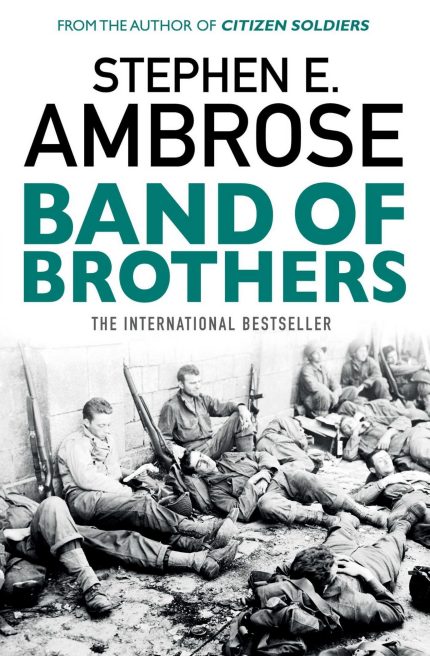Band of Brothers: E Company, 506th Regiment, 101st Airborne from Normandy to Hitler’s Eagle’s Nest, by Stephen E. Ambrose

Band of Brothers: E Company, 506th Regiment, 101st Airborne from Normandy to Hitler’s Eagle’s Nest by Stephen E. Ambrose
My rating: 2 of 5 stars
Recently, I watched the series “Band of Brothers” and was surprised by its quality. The often-used introductory statements of the former members of the 101st were very impressive and lent the series a lot of credibility.
After having watched the final episode, I decided I wanted to read Ambrose’s book that served as the source material. Little did I know what awaited me…
While the series provided me with a consistent, logical stream of events, the book simply adds anecdote after anecdote. There’s hardly any reflection on those anecdotes either and if Ambrose tries to add his analysis, it’s sadly lacking, simple-minded and features lots of “Hooray patriotism” that’s part of what actually caused the war he narrates about.
At times, Ambrose tries to actually support his point of view by citing other works – unfortunately, they’re mostly of similarly questionable quality as his own book. In other cases, Ambrose references books that were written in the immediate aftermath of the war and, thus, still strongly subjectively influenced.
I for one, though, prefer a proper history book on World War II and not a collection of anecdotes. Especially the strong hero worship Ambrose resorts to all too often…
“The coordination with British artillery was outstanding. So was Winters.”
… truly annoys me: From what I’ve read about Richard Winters beyond the praise Ambrose never ceases to sing, Winters must have been a great man and soldier. So let his deeds speak for himself, i. e. Wikipedia calmly tells us that “Winters agreed for the statue to bear his resemblance on the condition that the monument would be dedicated to all junior officers who served and died during the Normandy landings.” when they erected a statue at Utah Beach.
The series itself actually shows the war as it must have been – grim, bloody, horrible. Whenever the former soldiers get to talk about their experiences, they often get teary-eyed whereas Ambrose belittles what they got through by making it look easier than it could have been. And, in fact, Ambrose stoops so low that he compares the weapon fire to Fourth of July fireworks:
“War provides more meat to satisfy that lust than any other human activity. The fireworks displays are far longer lasting, and far more sensational, than the most elaborate Fourth of July display.”
Wow, just wow. Please excuse me for a moment while I vomit.
Sometimes, Ambrose tries to get in some German quotes into his narrative. Unfortunately, these parts obviously got very little attention by him or his editors:
“Hinkle, Hinkle, ist das du“
To me, a German, this reads like a verbatim translation of “is that you?” whereas proper German would be “bist Du das?”. It’s a small issue but it’s just as annoying as the military abbreviations Ambrose liberally uses. Yes, after a few uses I can imagine “CP” stands for Command Post”, “OP” for “Outpost” or “ETO” for “European Theatre of Operations” but till I figured it out, it was confusing for no good reason.
And while Ambrose obviously is a fan of “Ike” Eisenhower, he’s not good enough to avoid belittling other famous commanders like Montgomery:
“Ike needed the 101st and 82d in the line. It was a question of timing. Eisenhower wanted to attack even before New Year’s Eve, but Monty, commanding the forces (all American) on the northern shoulder of the Bulge, stalled and shivered and made excuses, so it did not happen.”
A little xenophobia bordering on racism (another cause for the war) isn’t something Ambrose is much concerned with either:
“Had Reese been a Soviet, German, or Japanese soldier, this little nonincident probably would have turned out differently.”
(The “non-incident” he’s talking about is severe, continued sexual harassment of civilians, by the way.)
War crimes are talked about but there’s no criticism at all:
““You shoot him,” Moone replied. “The war is over.” Skinny Sisk stepped forward, leveled his M-1 at the fleeing man, and shot him dead.”
Pretty much the only decent thoughts expressed in “Band of Brothers” are, interestingly, those of Richard Winters again who remembers reaching a concentration camp:
“The memory of starved, dazed men,” Winters wrote, “who dropped their eyes and heads when we looked at them through the chain-link fence, in the same manner that a beaten, mistreated dog would cringe, leaves feelings that cannot be described and will never be forgotten. The impact of seeing those people behind that fence left me saying, only to myself, ‘Now I know why I am here!’ ”
I will definitely avoid Ambrose as an author from now on and stick to my history books.
View all my reviews